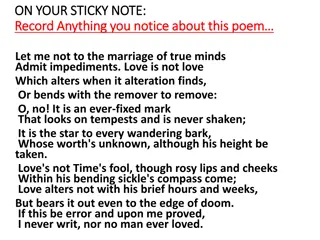Analysis of Shakespeare's Sonnet "Shall I Compare Thee to a Summer's Day
Shakespeare's Sonnet 18, "Shall I Compare Thee to a Summer's Day," explores the speaker's decision not to compare their beloved to a summer day due to the impermanence of summer's beauty. Instead, the sonnet praises the eternal beauty of the beloved, highlighting the depth of emotion and admiration the poet feels. Shakespeare uses vivid imagery and metaphor to convey the timeless nature of true beauty and love.
Download Presentation

Please find below an Image/Link to download the presentation.
The content on the website is provided AS IS for your information and personal use only. It may not be sold, licensed, or shared on other websites without obtaining consent from the author. Download presentation by click this link. If you encounter any issues during the download, it is possible that the publisher has removed the file from their server.
E N D
Presentation Transcript
Shall I Compare Thee to a Summer s Day William Shakespeare
Research William Shakespeare https://nosweatshakespeare.com/sonnets/18/
Shall I compare thee to a Summer's day? Thou art more lovely and more temperate: Rough winds do shake the darling buds of May, And Summer's lease hath all too short a date: Sometime too hot the eye of heaven shines, And oft' is his gold complexion dimm d; And every fair from fair sometime declines, By chance or nature's changing course untrimm d: But thy eternal Summer shall not fade Nor lose possession of that fair thou owest; Nor shall Death brag thou wanderest in his shade, When in eternal lines to time thou growest: So long as men can breathe, or eyes can see, So long lives this, and this gives life to thee.
Analysis In the opening line of this sonnet, Shakespeare asks if he should compare his loved one to a summer's day. The obvious answer would seem to be that he should, but in fact he does not. He goes on to say that his beloved is more lovely and more temperate (less extreme/milder) than such a beautiful day. This sets the tone for the first two quatrains (four lines) in which the poet explains why summer does not match up to his beloved. Note that the poet is speaking directly to his beloved in the sonnet. This adds a sense of intimacy to the poem.
The poet tells us that even in May, the buds can be shaken by 'rough winds'. He also points out that summer does not last long. It has 'all too short a date'. Sometimes the sun burns too brightly and it is too hot, and at other times the 'gold complexion' of the sun is 'dimm'd' or hidden by clouds. Everything that is fair or beautiful can fade, either by accident 'chance' or the changing seasons: 'nature's changing course'. The beauty of summer fades into autumn each year. For this reason, the poet does not want to compare his loved one to something so transient and imperfect as a summer's day.
This is an interesting reversal of the normal expectations which might be raised by the question the poet asks in thefirst line. We could reasonably expect the poet, having asked such a question, to justify why he might say that his beloved is every bit as lovely as a summer's day. But this is not the case. Instead, he holds the summer's day up to the harsh light of criticism, and finds it wanting compared to the object of his affections. This shows us the strength of feeling Shakespeare has for his beloved.
Normally, when a poet uses metaphors, similes or analogies, the purpose is to show how the subject of the poem matches up to the object to which they are compared. Here, it is the other way around. Such a reversal makes us sit up and take notice in a way we might not in a more clich ed praise of an adored object.
In the third quatrain, Shakespeare addresses his beloved again. He has told us why the summer cannot compare to his loved one, and now he explains why his beloved's beauty is more long-lasting. The use of the word 'But' signals this change in the poem. The poet says that the loved one's beauty will not fade or be forgotten because it will be immortalised in this poem. Even when his loved one dies, Death will not be able to boast that he has control now. Shakespeare's beloved will live on in the lines he has written and will not fade in death but will continue to grow because of his sonnet. The lines will be 'eternal' and in them the loveliness which Shakespeare treasures will be preserved for all time.
The sonnet ends with a couplet (two lines) inwhich Shakespeare makes the claim that as long as there are people on earth, his loved one's beauty will live. He says that the poem will live as long as there are people to read it, and because of that, his beloved will live on too and will be given eternal life by the sonnet. The repetition of the words 'So long' and 'this' in both lines emphasise the theme of the poem as well as giving a pleasing end to the sonnet.
Rhyme and Rhythm A Shakespearean sonnet consists of fourteen lines, each containing ten syllables and written in iambic pentameter. Iambic pentameter means that the poem has a fixed rhythm in which an unstressed syllable is followed by a stressed syllable. This is repeated five times in each line, giving a total of ten syllables per line.If we look at the final couplet of this sonnet, for example, we can see this rhythm clearly. I have underlined the stressed syllables only.Solongas mencan breathe, or eyescan see,So longlives this, and thisgives lifeto thee.The iambic pentameter makes the poem easier to remember, but also makes the sentiments expressed seem more definite and convincing than they might appear in a poem with a looser rhythm or rhyme-scheme.
Themes Love: The language is quite straightforward and each line is quite self-contained. This can be seen in the number of punctuation marks: most lines end with one. The love expressed in this poem is simply, yet movingly expressed. The passing of time / fleeting nature of beauty: both are linked to physical beings, they will pass away. However, if they are captured in poetry, they can live forever. This poem is about the transience of life and of beauty. As long as
Understanding Questions 1. According to the speaker, why is summer not an adequate comparison for his beloved? 2. In your opinion, what is the eye of heaven ? (a) God (b) The Sun (c). The clouds 3. According to the speaker, what happens to eradicate the beauty of nature? 4. Why will the eternal beauty of the speaker s love never fade? 5. Number the 10 syllables in eachv line of the sonnet
Explore Questions 1. Shakespearean sonnets follow a specific rhyming scheme. Identify the rhyming scheme of a Shakespearean sonnet by writing out the rhyming scheme used in Shall I Compare Thee ;. Does this rhyming scheme contribute to the mood of the sonnet? 2. Which image do you think is most memorable in this sonnet ? Explain your choice (x3 pqes) 3. Do you think the sonnet effectively capture the theme of love? Give a reason for your answer (x3 pqes) 4. You have been asked to visually represent this sonnet. Describe the three images you would choose and explain your reasons for each choice
Write your own sonnet This written piece could be including as part of your collection of texts for cba2 Make sure to conform to the rhyming scheme of the Shakespearean sonnet
Exam Q 2022 Exam Question: Do you think that poets offer readers hope throughout their poetry? Explain your views with reference to at least three poems you have studied. Refer to both the ideas and the use of language in the poems you discuss.























